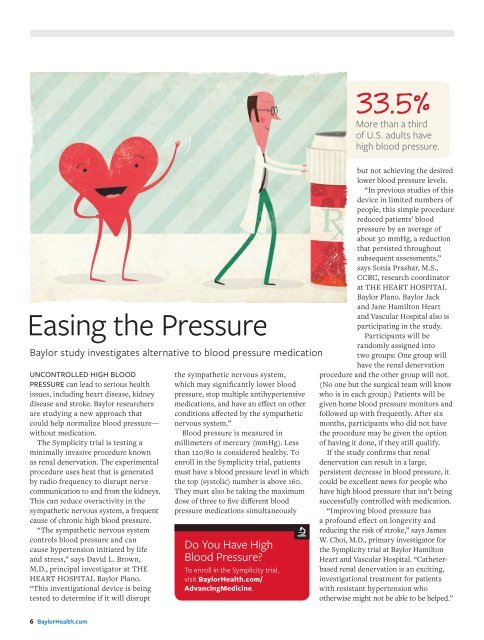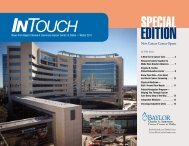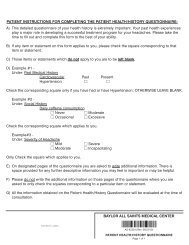Saints Fort Worth - Baylor Online Newsroom - Baylor Health Care ...
Saints Fort Worth - Baylor Online Newsroom - Baylor Health Care ...
Saints Fort Worth - Baylor Online Newsroom - Baylor Health Care ...
- No tags were found...
Create successful ePaper yourself
Turn your PDF publications into a flip-book with our unique Google optimized e-Paper software.
33.5%More than a thirdof U.S. adults havehigh blood pressure.Easing the Pressure<strong>Baylor</strong> study investigates alternative to blood pressure medicationUNCONTROLLED HIGH BLOODPRESSURE can lead to serious healthissues, including heart disease, kidneydisease and stroke. <strong>Baylor</strong> researchersare studying a new approach thatcould help normalize blood pressure—without medication.The Symplicity trial is testing aminimally invasive procedure knownas renal denervation. The experimentalprocedure uses heat that is generatedby radio frequency to disrupt nervecommunication to and from the kidneys.This can reduce overactivity in thesympathetic nervous system, a frequentcause of chronic high blood pressure.“The sympathetic nervous systemcontrols blood pressure and cancause hypertension initiated by lifeand stress,” says David L. Brown,M.D., principal investigator at THEHEART HOSPITAL <strong>Baylor</strong> Plano.“This investigational device is beingtested to determine if it will disruptthe sympathetic nervous system,which may significantly lower bloodpressure, stop multiple antihypertensivemedications, and have an effect on otherconditions affected by the sympatheticnervous system.”Blood pressure is measured inmillimeters of mercury (mmHg). Lessthan 120/80 is considered healthy. Toenroll in the Symplicity trial, patientsmust have a blood pressure level in whichthe top (systolic) number is above 160.They must also be taking the maximumdose of three to five different bloodpressure medications simultaneouslyDo You Have HighBlood Pressure?To enroll in the Symplicity trial,visit <strong>Baylor</strong><strong>Health</strong>.com/AdvancingMedicine.but not achieving the desiredlower blood pressure levels.“In previous studies of thisdevice in limited numbers ofpeople, this simple procedurereduced patients’ bloodpressure by an average ofabout 30 mmHg, a reductionthat persisted throughoutsubsequent assessments,”says Sonia Prashar, M.S.,CCRC, research coordinatorat THE HEART HOSPITAL<strong>Baylor</strong> Plano. <strong>Baylor</strong> Jackand Jane Hamilton Heartand Vascular Hospital also isparticipating in the study.Participants will berandomly assigned intotwo groups: One group willhave the renal denervationprocedure and the other group will not.(No one but the surgical team will knowwho is in each group.) Patients will begiven home blood pressure monitors andfollowed up with frequently. After sixmonths, participants who did not havethe procedure may be given the optionof having it done, if they still qualify.If the study confirms that renaldenervation can result in a large,persistent decrease in blood pressure, itcould be excellent news for people whohave high blood pressure that isn’t beingsuccessfully controlled with medication.“Improving blood pressure hasa profound effect on longevity andreducing the risk of stroke,” says JamesW. Choi, M.D., primary investigator forthe Symplicity trial at <strong>Baylor</strong> HamiltonHeart and Vascular Hospital. “Catheterbasedrenal denervation is an exciting,investigational treatment for patientswith resistant hypertension whootherwise might not be able to be helped.”6 <strong>Baylor</strong><strong>Health</strong>.com
















